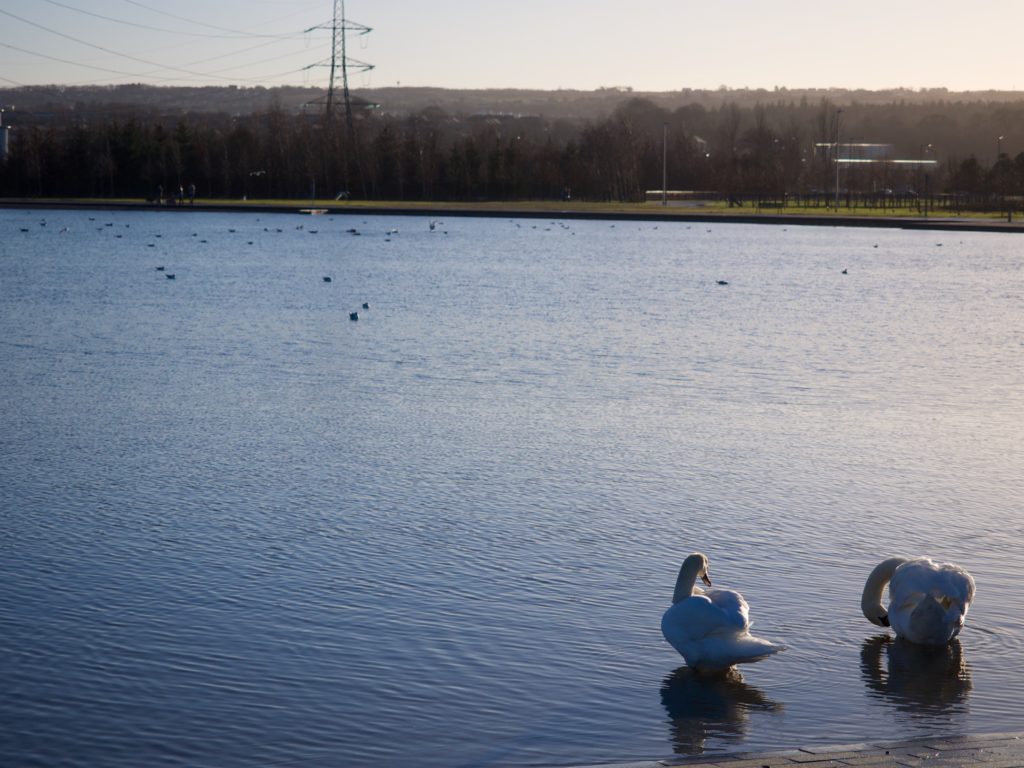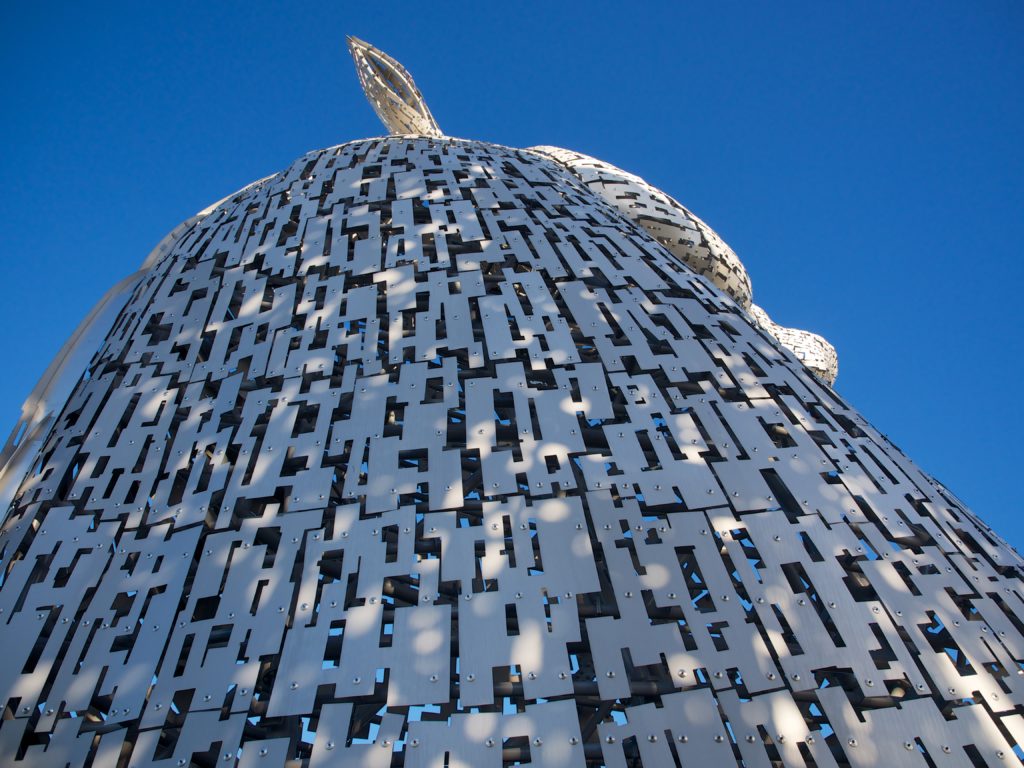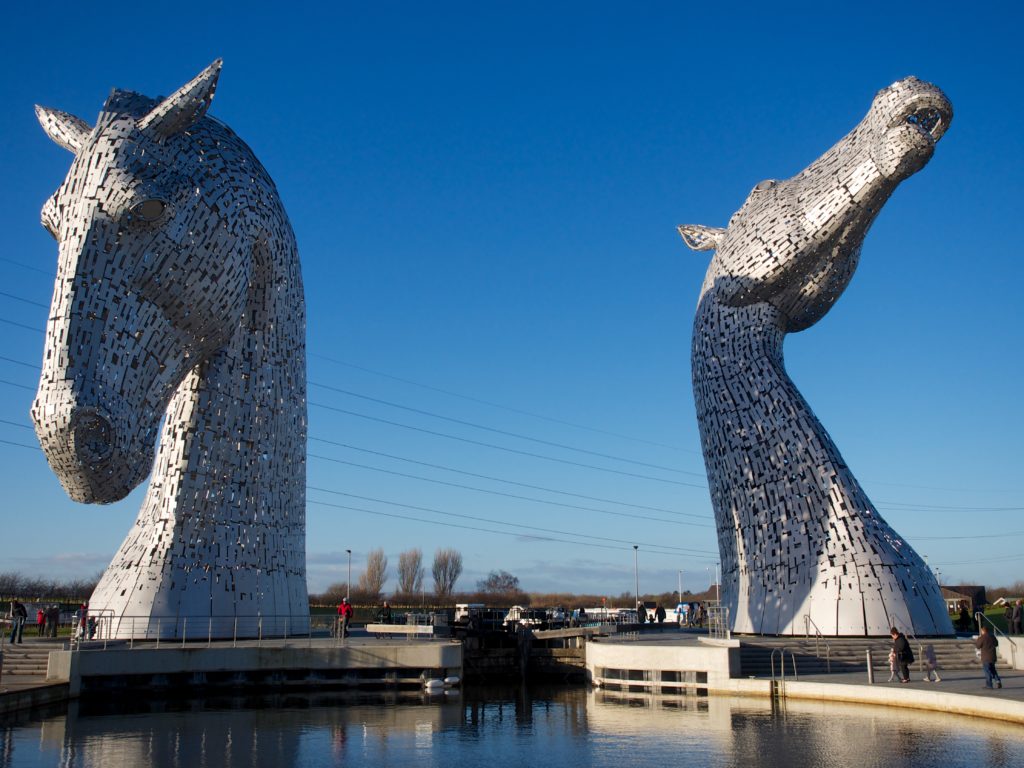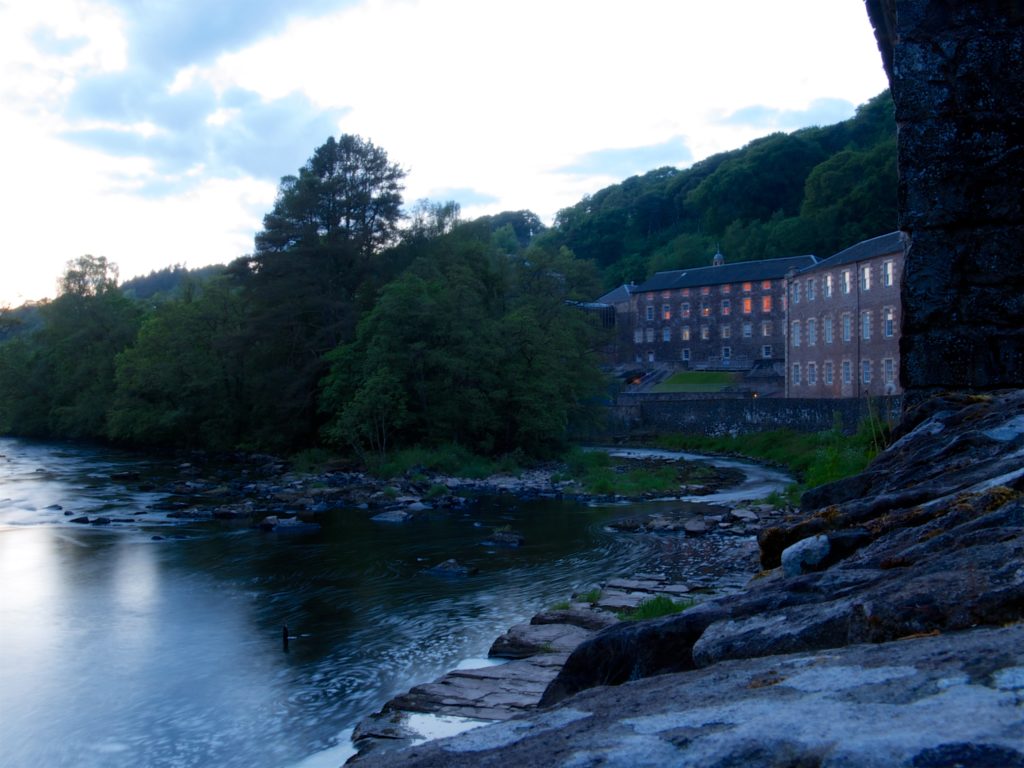





















This is something salvaged from theOneliner.com’s blog section, now marked for deletion.
As it turned out, preparing to get married was pretty time consuming. Who knew? As such, our usual year-end round up podcast was been delayed to the point of it being slightly ridiculous to record, so in lieu of that here’s a write up of my thoughts on the matter.
Space year 2014 year saw another marked decline in the number of films I could watch – as it turns out, changing jobs and moving thirty miles from the nearest cinema limits your casual viewing opportunities.
So, there’s a bunch of films that I’d expect to be worthy of consideration that I’ve just not got round to, such as Nightcrawler and Boyhood, but of the films I’ve seen that had a U.K. cinema release in 2014, the best was pretty clearly 12 Years a Slave.
Old news by this point, of course, due to its 2013 release Stateside, but there’s no question in my mind that 12 Years a Slave‘s examination of the misery slavery inflicts and the strength of Solomon Northup was the best film of the year, and made for compelling, if deeply uncomfortable viewing. It also managed the unusual trick of being strangely timely, given the increasingly fractious state of race relations across the USA in 2014. Hardly laugh a minute stuff, but it’s essential viewing.
Beaten out by the thinnest of whiskers was The Grand Budapest Hotel, the latest of Wes Anderson’s whimsicals. It’s certainly open to accusations of being yet another Wes Anderson film from his production line of quirk-laden light entertainment, but this has his schtick condensed into the closest we’ve seen to a Platonic ideal of a Wes Anderson film. His usual eye for beautiful, colourful sets is unmatched here, and the blistering delivery of Ralph Fiennes makes this a hilarious experience. Lovely.
Another favourite that’s also pretty damn quirky was Es-Cor-Zeezies’ ludicrous Wolf of Wall Street, which seems every bit as fantastic as any of Anderson’s output but with the added jaw-drop of being largely true. High flying fraud at it’s most decadent, disgusting and amusing, tightly told and with great performances all round.
Gone Girl marks another top flight outing from David Fincher, with Ben Affleck silencing any remaining critics of his ability in front of the camera with a great turn as a wayward husband falling under suspicion of murdering his missing wife. Taking a few risks with tonal shifts as the narrative takes a few turns, if not outright twists, it turns out to be as much a black comedy as it is a thriller.
Spycraft next, with Anton Corbijn’s A Most Wanted Man, featuring a typically excellent Philip Seymour Hoffman in one of his final roles. As with Tinker Tailor Soldier Spy, it’s taken from a John le Carré novel and has the same low-key, believable approach to intelligence gathering and counter terrorism. It’s perhaps open to criticism of being ‘just’ a procedural, but when it’s done this well, who cares about that?
While the category of “best documentary film I watched this year” has, to the best of my recollection, only one runner, Jodorowsky’s Dune is a hell of a one to pick, especially with my particular cross-section of interests. Running through gonzo Chilean director Alejandro Jodorowsky’s stunningly described vision for bringing Frank Herbert’s novel Dune to life before David Lynch took his crack at it, it’s an engaguingly told story of trying to bring a grand vision to screen, even if sadly it ends in failure. No Space Emperor Andy Warhol for us.
In the admittedly beslendered field of my cinema-going for 2014, the above six were, I felt, a clear notch above the others, but that’s not to say there’s not a good number of great films waiting to fill up my top ten. You could take your pick from any of American Hustle, Inside Llewyn Davis, X-Men: Days of Future Past, Captain America: The Winter Soldier, Edge of Tomorrow or August: Osage County and have no less valid a list, all of which are well worth taking a look at. Particular mention should go to Captain America 2, as it’s such a huge improvement over the first and does a great job of bringing some character to Cap’n, which was sorely lacking in both the first film and the Avengers flick.
Meanwhile, at the shitty end of the stick, there’s competition for the most conventionally awful film between A Million Ways to Die In The West, a comedy that misfires too often for its own good and Hector and the Search for Happiness, which kills audiences with its tonal whiplash as it jumps between “breezy self help guide” and “Guantanamo-ish interrogation dsytopia”. However neither of these can match the peerless puddle of pish that was Under The Skin, a slow, meaningless look at Alien Scarlett Johansson luring Glasgow punters into a basement pool o’dissolution before running off to the woods. Glacially paced, amatuerish and pretentious beyond measure, any message it may have about the human condition would have to be arrived at purely by chance. Not recommended.
If you’re at all interested, the below list gives (to my recollection) the complete list of eligible films in a rough sort of order of preference, although I’ve only really given serious ranking consideration to the top and bottom ends, and there’s a pretty huge gulf between the awful Hector and the Search for Happiness and the merely sub-par Dracula Untold and Amazing Spidey 2.
12 Years A Slave
The Grand Budapest Hotel
The Wolf of Wall Street
Gone Girl
A Most Wanted Man
Jodorowskis Dune
American Hustle
Inside Llewyn Davis
X-Men: Days of Future Past
Captain America: The Winter Soldier
Edge of Tomorrow
August: Osage County
Exodus
Hobbit 3
Hunger Games 3
Malefecent
Guardians of the Galaxy
The Lego Movie
Enders Game
The Judge
Interstellar
Her
Sin City: A Dame To Kill For
Jack Ryan: Shadow Recruit
Jersey Boys
Robocop
Monument Men
Godzilla
The Amazing Spider-Man 2
Dracula Untold
Hector and the Search for Happiness
A Million Ways to Die In The West
Under the Skin
This review has been ‘repurposed’ from my other site, theOneliner.com
There were a few reasons for us first setting up this ‘ere film opinion delivery vector, back in the beginnings of recorded history. One of them happened to be the, in our opinion, glibly handed out short shrift given to some reviews of sequels – sequelitis being, as much as we moan about it now, as big of an issue back then in the early seventeen hundreds when we first put digipen to futurepaper. There seemed to be no shortage of reviews saying little more than, “if you liked the last film, you’ll like this one”.
By this point I’m sure you can see where this is headed, which is to say that the most succinct distillation of my opinion on Sin City 2: A Dame to Kill For is that if you liked Sin City, then you’ll like Sin City 2. This time, at least, there’s a complicating wrinkle in as much as going into the multiplex, I had only the vaguest recollections of what went on in Sin City. Indeed, the nine years since the original release has muddied my thoughts on the film down to “Stylish. Violent. Overblown. Moderately Enjoyable”. Certainly, I’d no recollection of the plot details, having neither rewatched nor particularly thought about the film in the past near-decade. I was surprised, therefore, to see so many of the plotlines carrying forward from the fallout of the first film.
It’s not a huge issue, I suppose, given that none of the plots or characters are complicated enough that a great deal of catching up is required, and the themes are so broad that I don’t think prior knowledge of Sin City is essential. Although, of course, if you haven’t seen the first film, that there point regarding the utility of reviewing sequels based entirely on reference to the first outing rears its ugly head, which I guess means we’ve got some ‘splainin to do.
Basin City is the sort of town that makes a pre-Batman Gotham City look like, I dunno, somewhere nice and safe – let’s say Glasgow. Crime runs rampant, the police are more often than not another part of the disease rather than the cure, and violence, prostitution, and political corruption are so integral to the place that it’s just the commonly accepted background for people’s day to day shenanigans. Y’know, just like Glasgow. Also like Glasgow, it’s known locally as Sin City. Hence the name of Frank Miller’s series of graphic novels, from whence this movie adaption came.
We’re largely following the same shower of anti-heroic miscreants, such as Mickey Rourke’s intimidating, closer to Helllboy than human Marv, a slugger with a protection fixation on stripper Nancy (Jessica Alba). For her part, Nancy’s losing herself in booze following the death of Hartigan (Bruce Willis), talking to her hallucinations of him while trying vainly to work up the courage to kill the appropriately cartoonishly corrupt Senator Rourke (Powers Boothe), ultimately responsible to having Hartigan killed after Hartigan offed his revolting Yellow offspring.
Dwight is still around, although this time he’s notably more Josh Broliney than Clive Owenish. He’s the fella around which the plot surrounding the titular dame to kill for, Ava (Eva Green), er, surrounds. Around. Anyhow, Ava’s an old flame that wandered out of Dwight’s life in search of a man with bigger attributes in the bank department, and wanders back in to Dwight’s life, and also the strip joint that’s unusually central to all Sin City activities, with a sob story about how poorly she’s being treated and how she fears for her life. To be fair, Dennis Haysbert’s hulking bodyguard/prisonguard following her around provides some circumstantial evidence for her predicament, which is enough to drag Dwight back in.
To no-one’s particular surprise, Ava’s manipulating Dwight and everyone else she comes into contact with for her own ends, including booty-blinded cop Mort (Christopher Meloni), leading to a great deal more conflict over the course of the film. Meanwhile Johnny (Joseph Gordon-Levitt) is getting into his own gambling related scrapes with Senator Rourke, tying back rather loosely into Nancy’s search for revenge against Rourke. So, rather like the first film, there’s a lot of activity going down. Lots of ins, lots of outs and what-have-you.
If my vague recollections and my previous review are anything to go by, the plot threads are even more disparate in A Dame To Kill For, so I have to applaud Rabbie Rodrigiez for weaving them together in a way that makes them appear more closely related than they are, on sober reflection. Given the spread of characters and plots, there’s an easily imagined version of this film that’s a complete mess, so again we have to applaud how smoothly this flows between the characters and their goals.
And, of course, you have to comment on the visual style of the film, the (largely) black & white process giving a credible emulation of the style of Miller’s graphic novels, which looks great. In small doses. Like, two hours every five years sort of doses, but that’s about in line with Hollywood’s delivery schedule. It retains the copious amount of monochromatic bloodshed from the previous film, and in a more realistically filmed context would seem completely gratuitous. Which, realistically, means that it is gratuitously violent, but the visuals are in such a different style that it hides it pretty well.
The minor axis of Sin City is its astonishing take on gender relations, which I’d call sexist if it didn’t seem to hold men in equally low regard. I mean, sure, there’s a number of strong female characters, but they’re uniformly male wank-fantasies, who don’t appear to have a sensible stitch of clothing between them. The men have at least been granted a wardrobe budget, but the price of that is they’re all various combinations of vain, greedy, arrogant, corrupt, violent, aggressive, idiotic or astoundingly easily manipulated, generally by Eve Green flouncing around with her baps out. In general, Sin City shows very little regard for humanity, making it the most accurate documentary of the last decade.
All this adds up to a film that’s, well, fine, if you’re in the market for this sort of thing. There’s a few good lines and a few good moments of action, which is just enough to stop your attention wandering too much. That said, there’s not enough of them to really recommend that anyone drop what they’re doing and rush out to see it. Which is largely my opinion of the first film, so, with a heavy heart caused by grave inevitability announce that if you liked the last film, you’ll like this one.
I feel so dirty.
I start writing this one week out from Scotland’s independence referendum, where as you may have heard Scotland narrowly decided to remain in its dysfunctional co-dependant relationship with the rest of the only-accurate-by-five-percent “United Kingdom”. As you can probably gather from the outpouring of bitterness, I was on the 45% side of that decision, and the scant consolation of the next few years of “telt ye so” helps very little with the inescapable feeling that we’ve voted to go down with the ship.
No matter what poll you look at, the takeaway was that the fears of the old outweighed the hopes of the young, as the cynical juggernaut of Project Fear and its wildly inaccurate claims were allowed to go unchallenged by a lop-sided, “No” dominated media. It’s difficult to see the repeated refrain of “don’t risk your pensions” as anything other than an attempt to intimidate the elderly, and it’s especially disappointing that no outlet challenged the basis for this – given that by the Department for Work and Pensions’ own admission, they’d be obligated to pay out pensions exactly as they would have done. It has, after all, already been paid for by a lifetime of work. I’m sure there’s an articulate case for remaining tethered to Westminster’s system, but the most repeated ones were all nonsense.
Anyway, if the “Yes” camp’s reaction has been a sense of sadness and disappointment, you’d expect the “No” supporters to be jubilant. I suppose they were, in their way, as the scum of the earth descended on George Square, starting running battles around Glasgow and, with a keen sense of situational irony, giving Nazi salutes from in front of a war memorial. Classy stuff, and all from behind a “No Thanks” banner.
We shouldn’t tar everyone with the same shitty brush, of course. There are some “No” supporters that aren’t the biggest fuck-knuckles to walk this Earth’s face, but you can’t dodge the fact that they’re on your team. UKIP are on your team. The BNP are on your team. The National Front are on your team. The Orange Order are on your team. Very marginally less disgustingly, the Tories and the Lib Dems are on your team. All of the daily mass media are on your team. The bankers are on your team. The Chinese government are on your team. Does that sound like a team you want to be part of? Does that sound like a team that’s got the same interests and aspirations as you do? Does that sound like a group of people, to use the term loosely, that has your best interests at heart? Hey, I’m as libertarian as the next guy. You can hop into bed with whomever you feel like, but you’re the person that has to look at themselves in the mirror the morning after.
An altogether more boring but no less disturbing reaction occurred in the politisphere, as the much lauded “vow” to deliver more powers to Scotland immediately started to fly apart, with the various parties fracturing off over the scope of what’s to be done. It’s almost as if, rather than being a comprehensive, detailed plan of action, this was merely a last ditch attempt at placation from an opposition backbench MP who’s so disinterested in government that he’s appeared at a mere 13% of House votes. It’s perhaps too early to say that the vow that, we have to assume, steadied some wavering voters is going to tear itself apart in subcommittees and then get voted down by angry Tory backbenchers, but I’m not going to be in the least bit surprised at dropping another “telt ye” bomb.
Meanwhile, it looks very much like we’re about to start dropping actual bombs as we start Yet Another Iraq War, but this time also with bits of Syria, which means we can soon add Bashar al-Assad to the list of people on our team. Yay, us. So glad we’re still punching above our weight on the international stage, killing off more people with armaments that cost enough to keep one of our burgeoning number of food banks running for a year. This is the direction that 55% of Scotland voted for. It’s a minor tragedy for us, and a soon to be pretty major one for those soon to be declared “militants”.
The final battlefront is, of course, by far the least important, as the cauldron of Twitter stirs up the usual amount of shite. Twitter has long been the single best place for the poorly informed to sling reckon-bytes at each other in 140 characters, guaranteeing the maximal amount of misunderstanding and upset on all sides of the argument. This is why every topic on Twitter, regardless of importance, devolves into Youtube comments.
The latest attempt at hashtag clicktivism, or whatever buzz-worthy slogan is being used today to describe digital time-wasting, is a One Scotland campaign, where a generous interpretation would be an attempt to move forward with the issues facing Scotland. A rather more grounded interpretation would be that they’d rather we weren’t talking about referendums at all.
This will, of course, fail miserably. Independence has been on the Scottish political agenda since 1707, and it’s not likely to be removed soon. This is many people’s lifetime political goal. Not the same person since 1707, of course, but suggesting that we ignore what’s just happened is madness.
It’s also a highly undemocratic way to attempt to stifle political opinions, and the rationale for it is transparently false. People can work together without having to homogenise opinion, and there’s simply no need to do so. After all, despite the political landscape being dominated by the referendum for the past few years, Scotland appears to have avoided burning down, almost as if Holyrood can chew on more than one policy at a time. Who’d have thunk it, etc.
We need to talk about this result, probably for years. It’s huge. And hugely divisive, by it’s very nature. The fourth biggest city in the U.K. doesn’t want to be in U.K. That’s a thing we’ve found out. We have to think about what that means for everyone, and it’s much too complex a topic to move on from, or indeed capture your thoughts on in a snarky tweet.
Frankly, I’m not even going to touch on the other side of the this pulling together business, which would mean working with people who’ve been demonising us for past two years, with such constructive arguments as you’re liars, you’re cybernats, you’re bullies, you smell of wee, and such like. To an extent that’s just the internet talking, dragging everyone down into the filth, but it’s not the sort of behaviour that makes reconciliation a particularly attractive option.
The biggest loser in all of this is difficult to predict – there’s a great many people who will be losing. There’s a solid argument that it’s Scottish Labour, though. It’s widely acknowledged that they’ve led a hopeless campaign, continuing under the hopeless leadership of Johann Lamont. Clearly, they’re now refusing to learn from their supposed-to-be-unachievable crushing at the last Holyrood election and are locked into their blinkered path of focusing squarely on bashing the SNP. They have been rewarded for this laser-like focus by losing traditional support base in areas such as Glasgow, and by vastly increasing the SNP’s membership.
This is just another step in the continual lurch to the right that’s removed the Labour party from anything that would be remotely familiar to its founders, a party of austerity and cutting child benefit. Their continued tone deaf approach to their support will, I predict, leave them facing real problems at next year’s election. They have already alienated enough of their support that the phrase “anyone but Labour” is starting to be heard. That’s the real reason for the One Scotland campaign, to attempt to ameliorate the coming maelstrom. There’s quite a lot of people who aren’t likely to allow that to happen.
It’s crazy what you could’ve had.
This is something salvaged from theOneliner.com’s blog section, now marked for deletion.
I’ve kind of eschewed the whole end-of-year lists thing recently, largely because I’m all too aware that there’s a number of generally well regarded films of 2013 that should have a solid chance of featuring here that I’ve not had the opportunity to watch yet, like The Act of Killing, Upstream Color, or Sharknado.
That said, having finished up preparations for our 2013 round-up podcast I’ve basically already undertaken such a task, so what lazier way to churn out an article better way to further expound on these great films than reproduce it here.
For me, the best film of 2013 was clearly Spielberg’s Lincoln, a masterful biopic with an astounding central turn from D-Day Lewis and an equally talent laden supporting cast. Even with the background of a civil war and the historic importance of the vote abolishing slavery at the heart of the film, there was still a danger this could have become a rather dull political procedural rather than the riveting character piece what it done had become and that.
In general 2013 proved to be a solid year for films, with a healthy number of contenders for spots in these sorts of list, although unless we’re about to enter a particularly dry spell Lincoln is most likely the only film that would be promoted to the “films of the decade” league. The rest of these films perhaps shouldn’t be seen as pitted against each other in a numerical deathmatch, but as a number of damn fine films well worth catching up on, if they’ve passed you by during the year.
There’s a highly enjoyable blend of coming-of-age drama and comedy in The Way, Way Back, the former from a solid performance from Liam James’ struggle with hid family life and obnoxious stepfather (itself a douchtacular turn from Steve Carell), and the latter from a blisteringly in-form Sam Rockwell.
I’d go so far as to say that of all the Ironmenz, the best Ironmenz is the Ironmenz that is Iron Man 3. Downey Jr. seems much more animated in this instalment, certainly compared to the lacklustre-to-the-point-of-lustrelessness second outing, bringing great energy to Shane Black’s flick. One thing it has in common with the surprisingly good, although not as good as this, Thor 2: Oh Baby I Like It Thor, aside from the light hearted sense of fun that’s a great antidote to the increasingly po-faced Marvel films, is an innovative approach to staging their CG setpieces that find much more interesting things to do that devolving into one set of polygons thumping another set of polygons. Although, naturally, there’s still a fair bit of that.
Recalling Zodiac in tone, Prisoners is a very gritty drama about Huge Jackman, the hugest of all the jackmen, reacting to the abduction of his daughter in very extreme although understandable ways. Jackman himself might be overdoing it a little, but the excellent supporting cast including Paul “Book’em” Dano, Jake Gyllenhaal and Maria Bello ground it admirably.
Corrupt cops now, with James McAvoy in Filth making Bad Lieutenant seem like a paragon of good procedure. Based on Irvine Welsh’s novel, it pulls off a morally ambiguous trick of making a despicable central character likeable and even sympathetic, and we can’t really understate how despicable he is. Boundlessly energetic and with a brilliant supporting cast for McAvoy to bounce off, Filth is a pleasure you’ll feel guilty for enjoying. Like a chocolate and pepperoni pizza. With a bacon stuffed crust.
A number of great comedies appeared this year, all of which I offer no further justification for inclusion other than making me giggle like a schoolboy – Alan Partridge: Alpha Papa, This Is The End, The World’s End, Bad Grandpa and Anchorman 2. And the greatest of these is Alpha Papa, for lo, Steve Coogan hath playedeth a blinder. Eth.
Hailing from perhaps theOneliner’s favourite studio, Studio Ghibli, From Up On Poppy Hill provides delightful depictions of everyday life and emotional, touching moments of human connections that make this a joy to watch, and looks absolutely beautiful while doing so. The central narrative might not be too strong, and not much more than a thin excuse to throw the leads together, but that’s so easy to excuse when it does so much else so well.
My interest in Formula 1 is largely captured by the numeral zero, so I was pleasantly surprised by how much I enjoyed Rush. The racing is very much secondary to the clash in styles and personalities of Lauda and Hunt, two nuanced characters that the film wisely chooses not to play as hero and villain. Terrific performances from Chris Helmsworth and Daniel Bruhl make this as good a sporting bio-pic as I’ve seen.
The marketing push for Philomena seemed to be positioning it as a mismatched couple road trip comedy, which to be fair it is for perhaps five percent of the film, as Coogan’s stuck-up, occasionally obnoxious journalist clashes with Dench’s warm, unassuming Grandmother act. However given that the rest of the film is dealing with the Church stripping babies away from mothers, a decidedly less knockabout concept, I can’t help but feel it’s a trifle misleading. Excellent drama, and great chemistry between the leads.
I’m not exactly on board the awards train that Gravity seems to be riding. It’s an impressive film visually and Bullock’s on rare form, but it’s rather slight in the narrative and believability categories. Regardless, it’s still one of the better films of the year and its comforting that on occasion H-wood is prepared to sink big money into something relatively risky.
My “bubbling under” list of films that narrowly miss out on special mention but are nonetheless worthy of your attention consist of: Star Trek: Into Darkness, The Hobbit: Desolation of Smaug, Elysium, Robot and Frank, In The House and Flight.
A few “try hard” awards now, for two films that have enough flaws that I couldn’t unreservedly recommend, but do enough interesting things to warrant some attention. Cloud Atlas is, by design, a convoluted mess of a film, but for every mistep or oddity there’s a slightly larger step on the opposite side of the continuum, leaving the film narrowly ahead on points. The imagination, artistry and technical achievements of the film make it at the very least worth of investigation. More in my review, if you’re intrigued.
A more conventional, and more conventionally flawed, film that’s a mixed bag is Man of Steel, Zack Snyder’s take on re-rebooting the Superman franchise. It could stand to have a lot more Superman in it, and the tonal shift more towards Nolan’s Batman seems more of a franchise crossover necessity than something emerging from the script, but there’s a glimmer of something special yet to come from this time round on the Superman merry-go-round in Man of Steel that’s worth persevering through the duller moments.
And so to the walk of shame for the films I really didn’t like at all in 2013. As usual, I’ll separate off the horror films, as I just don’t appreciate the genre even when done well. I have no doubt there’s a vast reservoir of worse horrors released last year than Mama, but as it looked like the only one interesting enough to have me see it then it’s my least favourite horror of the year. And, statistically at least, my favourite horror film of last year, but to be clear – Mama is no good at all. Early on it does seem to have a lot of promise, with a great cast and efforts to ratchet up the tension, but throws all that away by revealing the monster early on, and boy, doesn’t it look laughable rather than horrifying. If they’d had kept that unwelcome surprise skulking in the shadows for a bit longer then it would have been a substantially better film.
Three films I expected rather more from, largely for the same reason, were Stoker, Zero Dark Thirty and A Field In England, all from directors I’d expect more of. All commit the same basic sin of being rather boring and lifeless indeed, although at least I can see what Stoker and Zero Dark Thirty were aiming for, if falling very short. A Field In England, however, is both nonsensical and as dull as ditchwater. Appropriately enough.
Perhaps the biggest disappointment of the year comes from Del Toro’s Pacific Rim, largely because it needed to do so little to keep the inner twelve year old happy, and instead chose to have a script seemingly written by a twelve year old. Robots clobbering monsters should be fun, not a loosely bound series of idiotic, reality contravening plot devices and awkward character interactions. The gut-wrenchingly appalling, needlessly witless script hobbles this terribly. Make it stop.
However, the biggest disappointment, and also the worst film of the year, comes from folks we were falling over ourselves to laud only two years ago, but the combo of Ryan Gosling and Nicolas Winding Refn this time run the quality inverter over Drive to come out with Only God Forgives, a boring, ugly, nasty and above all pointless film, laden with completely gratuitous violence and with no heart to it at all. It’s heavily influenced by Gaspar Noe’s “work”, which really says all you need to know. An abomination of a film.
Thankfully from the time of writing this, a mere twelfth of the way through 2014 there’s been at least two superb films to wash the taste from our mouths, and high hopes for many more to come. We’ll keep you only mildly misinformed of them through our podcast. Catch y’all later.




















(I wrote this a few weeks back for an apparently aborted current affairs satire podcast pilot, born of an excess of enthusiasm and vodka. The somewhat embarrassing dropping of any charges against the union brought it to mind, so I figured I’d promote it out of my ‘scraps’ pile.)
I am, of course, uniquely placed amongst the commentariat on Labour’s ongoing issues in the Falkirk West constituency, given my status as an escapee from the stifling confines of smallish Central Belt town to the stifling confines of Glasgow, giving me a differently stifled perspective on the political infighting that’s somewhere between a storm in a teacup and a battle for the very heart and soul of the Labour party. Which implies that the heart and soul of the Labour party can fit in a teacup, I suppose. I don’t have any paperwork to back that up. Let’s say “allegedly” and hope that’s weasly enough.
For those who, understandably, pay little attention to Falkirk, Central Scotland’s answer to Iowa, a recap may be in order. Let us introduce you to then Labour MP Eric Joyce, taking over the Westminster constituency after the respected MP (of which there used to be a few, surprising as that may seem to youngsters) Dennis Canavan chose to move to the Scottish Parliament, and was booted out of Labour as result, which does not seem to have proven much of a career impediment.
Joyce, although born in Perth, chose to represent Falkirk like a native, fighting for the interests of the people, particularly the segment of the people named “Eric Joyce”. He proved to be the top claiming member of the House of Commons between 2005 and 2006. A disappointing slide in form say him drop to 11th in the 2006-2007 grifter’s league, but some intense profiteering saw him back on top in 2008-2009 – including a spectacularly reasoned £180 expenditure on three oil paintings. When asked why he had used taxpayers’ funds in such a way he replied, “because they look nice.” Your tax pounds at work, there. All this hard effort paid off spectacularly, for Joyce at least, becoming the first MP to claim more than £1 million cumulatively in expenses.
It’s vital that we get value for money from our public officials, of course, and Joyce has chosen to help out with this country’s dire employment situation by ensuring that the Police are kept busy. Starting his criminal record with a comparitively boring six month driving ban for racking up 12 points on his licence, he moved on to more challenging offences, arrested in 2010 for failing to provide a breath test after another vehicular escapade.
Looking to up the ante, he was again arrested in February 2012 for assault, having been described as “going berserk, Falkirk-style”, headbutting a Tory MP and clocking his own party’s whip in what we in Falkirk would call “a normal Wednesday night”. Hot on the heels of this came a Daily Record article claiming the then 49 year old MP had “relations” with a 17 year old schoolgirl working for his campaign in 2010. That proved to be one straw too many, and Joyce soon tendered his resignation to the Labour party, presumably about ten seconds before he’d have been fired anyway.
However, like a particularly tenacious dollop of shite Joyce refused to be flushed from the system, choosing instead to merely not seek re-election in 2015. Despite now being out of Labour’s league table of nutballs, Joyce has proven to keep match-fit in the interim, bothering the po-po twice in the intervening year or so, once for cutting off the electronic tag awarded for his previous triumphs and again for another boozed up, taxpayer subsidised Parliamentary bar brawl.
It’s said that you get the government you deserve, but even at its very worst Falkirk’s not this horrible.
At any rate, the matter now at hand concerns picking the replacement candidate for the next election, normally a matter for the constituency Labour party. I’m left with the impression that this process wan’t thought about too deeply, as the now redrawn seat of Falkirk is now a so safe a Labour seat that it could be won by a tub of lard with a red rosette on it.
Following allegations that Unite chairman Stephen Deans had been on a recruiting spree at the local refinery, offering to pay their Labour party membership fees, which by itself doesn’t seem like much of an incentive, to be honest with you, questions have been raised at the national level of the extent to which Unite and other unions influence the Labour Party.
From a legal standpoint it appears the membership drive / ballot stuffing isn’t illegal, presumably more in a “technically not illegal” sense that politics is so good at finding, but it certainly looks suspect to most outsiders, particularly those already minded to think that those evil unions already ruined Blairite revenge fantasy by picking the wrong Miliband brother – not the anointed one, David, but the annoying one, Ed. Well, okay, they’re both annoying, I concede.
The investigation resulted in the National Labour Party taking over the selection process, and the suspension of Stephen Deans and provisional candidate Karie Murphy, which angered Unite General Secretary Len McCluskey. However Red Len McCluskey does rather give the impression of someone who’s always the merest slight away from fuming, incandescent rage. Heaven forbid a Starbucks barista mistakenly scribble “Ben” on the side of his machiatto, in the admittedly unlikely event he’d be allowed from a PR persepctive to order coffee from anywhere other than a burger van, or maybe Greggs on special occasions.
The more concrete, non-Unite word-slinging fallout may be more problematic for the Labour party, as Karie Murphy turns out to have been MP Tom Watson’s office manager prior to this fofferall. Tom Watson, I’d argue, is the closest thing the Labour party has to a respected, opinionated politician that can get results thanks to his involvement in the investigations into just how shitty the U.K. tabloid press is. If you don’t want to know the results, look away now: they are really, really shitty.
At any rate, Watson, incidentally Len McCluskey’s old flatmate, has resigned from his role as Campaign Co-ordinator in the wake of all of this nonsense, which is hard to see as anything other than a blow for a Labour party that’s struggling to look even remotely electable. At this rate it’s going to take Cameron and Osbourne campaigning on a platform of “firstborn children to be slaughtered” to move the needle towards the beleaguered Miliband camp, and even then it’s not a slam-dunk for the reds.
If this fiasco does result in the now mooted breaking of the bonds between Labour and the union movement, which lest we forget was the reason it was formed in the first place, it’s bound to be even more trouble for a party already decried as the Diet Tories. By stripping themselves of their founding and defining characteristic, they’re in danger of winding up as characterless and unappealing as their present leader.
And it all began in Falkirk. We’re so very sorry.